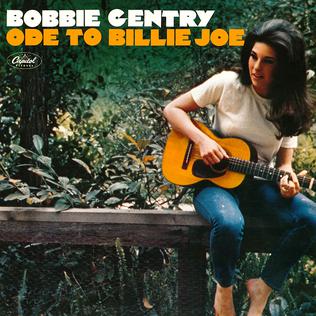 | Ode to Billie JoeBobbie Gentry |
Writer(s): Bobbie Gentry (see lyrics here) First Charted: July 21, 1967 Peak: 14 US, 14 CB, 12 GR, 14 HR, 7 AC, 17 CW, 13 UK, 11 CN, 4 AU (Click for codes to charts.) Sales (in millions): 1.0 US Airplay/Streaming (in millions): -- radio, 13.6 video, 17.83 streaming |
Awards:Click on award for more details. |
About the Song:Bobbie Gentry was born Roberta Lee Streeter in 1942. She grew up in Chickasaw County, Mississippi in a house without electricity. She later studied at UCLA and worked as a nightclub performer and model before recording her “massive, boundary-crushing hit” SG “Ode to Billie Joe” in 1967. The “haunting southern Gothic drama” TC was originally seven minutes long, but after it was whittled down to four, it was released as her debut single. Gentry’s “smoky tenor voice was pure southern sexuality” TC but also “chilly and controlled…mirroring the sort of traumatized in-shock blankness that her narrator radiated.” SG “The song isn’t soul or country or jazz.” SG It “was unlike anything Top 40 audiences had heard in years.” SS The song is “the work of a master storyteller” SS “where the story matters at least as much as the song.” SG It is “a gripping, first-person narrative unfolding a mysterious tale” SS about Billie Joe McAllister, a boy who jumped off the Tallahatchie Bridge. He and the narrator threw something off the bridge, but what? “Maybe they were just flowers, like what the narrator throws a year after Billie Joe’s death. Maybe a wedding ring. Maybe a draft card. Maybe drugs. Maybe a baby. Gentry never said.” SG It has even been theorized that it “was the collective innocence of the American people” SS being tossed off the bridge. 14-year-old Emmett Till’s body was thrown in the Tallahatchie River in 1955, helping to ignite the civil rights movement. SS Gentry said it didn’t matter. The song was about how “the people in the song treat each other. Even in a tight-knit rural family, there’s no empathy,” SG which the listener witnesses at the onset of the song when the Mississippi family apathetically discussed the suicide at the dinner table. In addition, the narrator and her mother are, as Gentry said, “unable to recognize their mutual loss or share their grief” TC when the father dies. “Ode” sparked an answer song from Bob Dylan; covers from Ella Fitzgerald, Tammy Wynette, and others; and even a Warner Bros. movie nine years later. Amusingly, Chickasaw County police had to start fining people for jumping off the Tallahatchie Bridge, which was only 20 feet of the ground. SG Gentry managed a few more top-40 hits, but recorded her last album in 1971 and eventually vanished from public life, living in a gated Memphis community. Resources:
First posted 4/17/2023. |








No comments:
Post a Comment